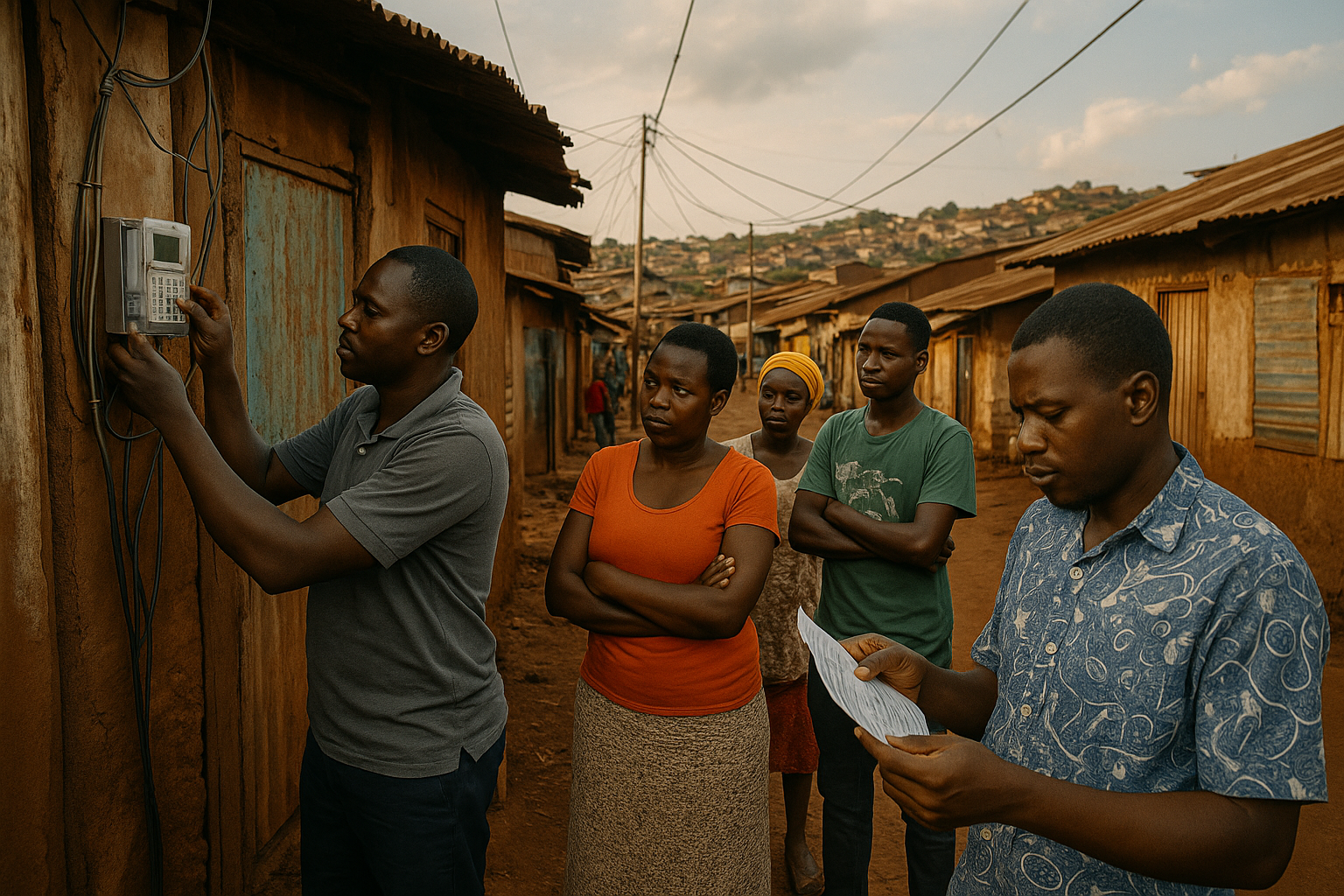From Theft to Trust: Rethinking Electricity Access in Kampala’s Urban Settlements
A new study by international and Ugandan researchers shows that while most households in Kampala’s informal settlements are connected to the grid, high tariffs, bureaucratic hurdles, poor infrastructure, and weak renter protections keep electricity access unreliable and inequitable. Community-driven solutions such as tariff reform, simplified connections, renter rights, and stronger local engagement could pave the way toward fairer, more inclusive energy access.

A new study conducted by a consortium of researchers from the University of California, Berkeley, Makerere University, the University of Massachusetts Amherst, Arizona State University, and partners such as ACTogether Uganda and the Institute of Development Studies at Sussex University exposes the deep contradictions in Kampala’s electricity access. While Uganda has achieved significant hydropower expansion and grid coverage, large portions of its capital’s population, especially the 60 percent living in informal settlements, continue to face electricity that is expensive, unreliable, and unevenly distributed. The Spotlight Kampala project, grounded in participatory action research, brought together academics, NGOs, policymakers, and over 500 residents to not only document barriers but also co-design solutions tailored to community realities.
Connected but Living in the Shadows
On paper, electricity access appears impressive: 95 percent of surveyed households and businesses reported having a grid connection. Yet the lived experience reveals a stark mismatch. Households consume on average only 34 kilowatt-hours a month, a fraction of the international benchmark for modern energy access. Electricity is primarily used for lighting, charging phones, and running televisions, while cooking remains reliant on charcoal in 93 percent of homes. The gap is bridged through precarious strategies: meter sharing, illegal tapping, and fuel stacking. Two-thirds of households reported sharing meters, and less than half dealt directly with the utility. Instead, they depended on landlords, neighbors, or informal electricians. These arrangements created vulnerability, leaving residents subject to sudden disconnections, inflated fees, or bans on using certain appliances.
The High Price of Power
Affordability emerged as the most pressing challenge. Uganda’s electricity tariff stands at 864 shillings, or 23 cents, per kilowatt-hour, among the highest in the region. Connection fees ranging from $125 to over $600 place formal access beyond reach for most, especially as the average household survives on a monthly income of just $183. Electricity accounts for about 5.5 percent of monthly budgets, but when charcoal and firewood are factored in, the share rises to 13 percent. Families frequently ration their usage by turning off security lights at night, forgoing refrigeration, or sitting in darkness when prepaid units run out. Despite this, community members repeatedly emphasized that theft is not a preference but a necessity. As one local electrician explained, “Give everyone a meter, they’ll eventually pay. Then, electricity theft would end; nobody loves stealing.”
Layers of Bureaucracy and Fragile Infrastructure
Beyond price, the complexity of the formal connection process remains a barrier. Applicants face lengthy paperwork, inspection fees, and the need for licensed electricians, all of which add to costs. Many lack tenancy or land documents, leaving renters, who represent 76 percent of settlement residents, dependent on landlords. Landlords often impose flat charges and restrict appliance use, leaving tenants powerless to negotiate. This leaves the majority of the urban poor as “shadow users” of electricity, paying for it but unable to make official claims. Even when households secure connections, the supply is unreliable. Remote sensors revealed outages three times a week, lasting about five hours each. Voltage instability was severe, with under-supply occurring 43 percent of the time in informal neighborhoods compared to 19 percent in formal ones. Infrastructure mapping showed poles straining under 30 or more lines and transformers overloaded to dangerous levels. One health worker likened failing transformers to bombs, underscoring the risks faced daily.
Building Trust Through Community Solutions
Relations between the utility, Umeme Limited, and residents are fraught with mistrust. Complaints about delays, poor communication, tariff hikes, and heavy-handed enforcement raids abound. Many residents do not even know the official tariff rate, a fact that reinforces suspicion and resentment. This adversarial cycle fuels illegal connections, which in turn invite punitive crackdowns. Yet when given the chance to design solutions, communities offered pragmatic ideas. They called for reduced tariffs and connection fees, simplified procedures, stronger renter rights, and infrastructure upgrades. Many also suggested establishing local utility sub-offices to handle complaints, partnering with trusted electricians for safer connections, and expanding subsidies for electric cooking to reduce charcoal dependence. Policymakers and utility representatives showed cautious openness to targeted subsidies and reforms to the lifeline tariff.
The participatory action research model proved critical. Residents openly discussed illegal connections, exploitative landlord practices, and everyday struggles because they were treated as partners rather than mere data points. The project also produced tangible benefits, from training young enumerators to creating jobs in infrastructure mapping. Yet sustaining this collaborative momentum after the project’s conclusion remains uncertain.
Looking ahead, Uganda’s planned re-nationalization of the electricity sector in 2025, ending Umeme’s concession, may open a new chapter. Public anger over tariffs has created momentum for reform, and the study argues that this is the right moment to integrate community-driven approaches into planning. The vision is not only about extending wires but about embedding principles of “energy democracy” and “infrastructural citizenship.” The findings demonstrate that Kampala’s urban poor are not passive victims of energy poverty but active problem-solvers with practical proposals. The question is whether decision-makers will seize the opportunity to listen, or whether communities will remain connected yet powerless in the shadows of the city’s electric grid.
- FIRST PUBLISHED IN:
- Devdiscourse










